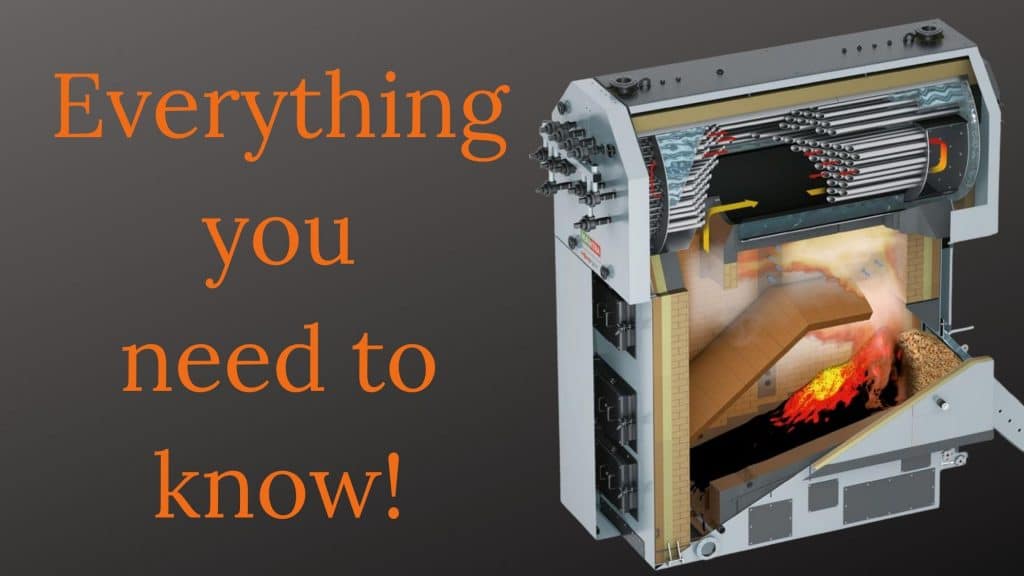The boilers’ classification is carried out based on the fuel they are fed (gas boiler, oil boiler, etc.). Therefore, a biomass boiler is defined as a heat generator that uses biomass as a fuel.
Biomasses are organic materials of vegetable or animal origin, which can be burned to generate electrical or thermal energy, producing very low polluting emissions. These are generally residues from crops, deforestation, and industrial activities of wood and paper processing.
What is a biomass boiler?

The biomass boiler is a heat generator that uses organic materials, such as wood or pellets, as fuel.
The general concept of biomass includes various types of material, all of which share that they can be easily transformed, usually through combustion, into electrical and thermal energy. All of this falls into the biomass category and can be exploited to produce energy.
What types of biomass are used in the boiler?
Here are the three most used biomass used in the boiler:
Wood:

Wood is a truly renewable energy source in nature since the process that goes from its birth to combustion describes a cycle perfectly in balance with the environment.
Chips:

The wood chips are produced with chipping machines by shredding the wood into flakes of variable size with a few centimeters length and thickness.
Pellets:

Wood in pellets is a fuel obtained from dried sawdust and then compressed in small cylinders with a diameter of several millimetres, typically 6-8 mm.
It is a high-yield natural fuel.
How does a biomass boiler work?
The operation of a biomass boiler is very similar to that of a traditional gas boiler. The combustion of biomass is used to heat the water that circulates in the heating system.
Modern boilers have automatic ignition, are modular, and interface perfectly with a thermostat.
Usually, the system requires a combination with a buffer tank to ensure a continuous supply of heat to the heating system.
You can also connect the biomass boiler to another boiler or solar thermal panels to produce hot water.
If you want to install this type of heat generator, another piece of advice I want to give you is to put a carbon monoxide detector. Not all the fuel burns and various gases can be generated, like this one.
You must also have a dry room where you can store the fuel supply.
Biomass boiler pros and cons
Energy needs have increased considerably over the last century. Not being able to exploit renewable resources, which are finite and polluting continuously, we are becoming more interested in renewable energy. Biomass boiler is one of the greatest gifts from the renewable energy sector. But it also has some pros and cons, just like almost everything!
Advantages of biomass boiler
The installation of a biomass boiler has two essential advantages.
Environment friendly:
the carbon dioxide (CO2) balance is neutral, as the quantity emitted in combustion is equal to that which plants need to grow.
Woody biomass is also a renewable energy source because forests grow back, unlike oil fields deplete.
Saves money:
In the face of initial investment for a much higher purchase than that necessary for the purchase of a gas boiler, you can obtain economic savings over time. The biomass price is lower and does not undergo all those fluctuations linked to the markets that concern fossil fuels.
On the other hand, wood-fired boilers are a bit tiring to manage. It is, in fact, necessary to load the wood by hand and empty the ash every two or three days (although some devices can do this automatically).
From this point of view, pellet boilers are much more comfortable. The ash can only be emptied once a year, and the management is very similar to that of a gas boiler.
Disadvantages of biomass boiler
The biomass boiler has some cons, and they are:
- It requires more spaces that gas or oil boilers
- It is costly to install
- Biomass boiler requires more work than gas and oil boilers
- It needs to be cleaned regularly
Which biomass is best for you?
If you need to heat a single housing unit, you will have to exclude the use of wood chips. This type of fuel requires a large silo and an extractor and is only suitable for systems over 50kW.
It can therefore be suitable for centralized condominium systems or district heating systems involving several buildings.
Wood or pellets are much cheaper for a single house.
- Solar Panel Maintenance And Cleaning Tips You Must Know - January 5, 2023
- Tips For Zero Waste Living in 2023 - January 2, 2023
- What Is Condensing Boiler and Why Do You Need It? - December 11, 2022

